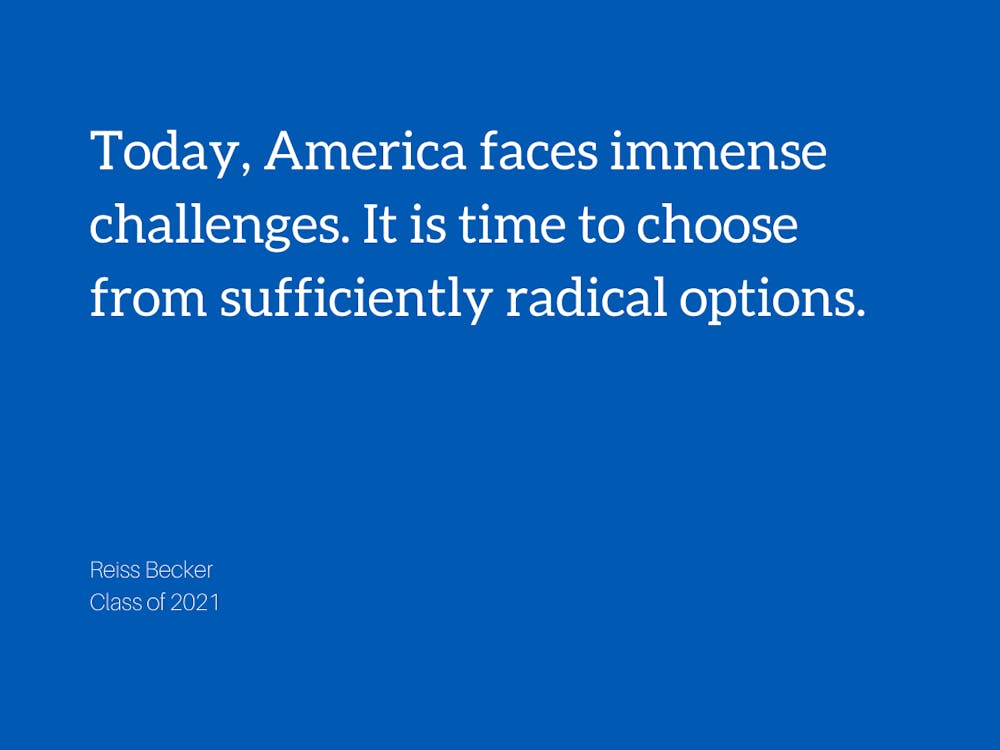I can’t help but like Bernie Sanders. I‘m convinced of his sincerity, of his genuine yearning for an equitable America. I admire his dogged commitment, a character trait that is manifest in his established record of ideological consistency. I am reassured by the urgency he exudes, believing as I do in the precarity of our present moment. Although I am not quite “feeling the Bern,” I’ll say this: Sanders is the sole Democrat I would consider supporting.
So why do I have such sympathy for the democratic socialist, despite a multitude of more moderate candidates? For one, I believe Bernie could potentially broker a truce in the endless, social fabric-rending culture wars. Relentlessly preoccupied with material issues and the “billionaire class,” Bernie could, as Ross Douthat argued, prioritize socialist economics over social liberalism.
His rhetorical tendencies signal a class-first conception of politics—when asked about stopping violence against transgender people specifically, Sanders emphasized the need to combat discrimination generally and how the passage of Medicare For All could bring people together. Which is not to say that Sanders believes transgender people unworthy of protection. But it is to say that Sanders views oppression from a markedly different standpoint than other Democrats, choosing to emphasize the class struggle that involves everyone, including transgender people, over an identity struggle. A stark contrast with Elizabeth Warren who just pledged to a let transgender child veto any of her nominees for Education Secretary.
Through and through, Sanders is a “beer track” candidate whose emphasis on material issues and class solidarity distances him from candidates on the “wine track” who kowtow to the party’s socially liberal, bourgeois bloc. These distinctions matter: they indicate that Sanders is serious about winning back a portion of the economically populist, socially conservative voters who were integral to Obama and Trump’s electoral success.
I also appreciate Bernie’s anti-interventionist tendencies on foreign policy issues. Deeply skeptical of prolonged military commitments abroad, Bernie is a dove with a restrained view of how American power should be used. The same cannot be said of many establishment Democrats such as Vice President Biden or Secretary Clinton. Bernie opposed the invasion of Iraq. He is in favor of reevaluating our country’s gross relationship with Saudi Arabia, an antediluvian, regressive regime that receives American support. And he favors ending our presence in Afghanistan. Bernie understands that every conflict abroad detracts from America’s ability to invest at home.
Like Trump, Bernie also understands that free trade policies create thinly dispersed winners and catastrophically concentrated losers throughout our society. And to the extent that Bernie would orient our trade policies away from the interests of multinational corporations and towards the interests of American workers, I would support him in that effort.
As for his domestic policies, I am far from fully supportive of the socialist agenda. However, I do sense room for a fruitful compromise between a subset of Republicans and a potential Sanders administration. Recently, leading conservatives such as Senators Hawley, Rubio and Lee have signaled an openness to economic proposals that deviate from free-market orthodoxy. In an ideal world, I assume Sanders would prefer to pass large, sweeping social programs. But what if he does not enjoy the requisite 60 seat Senate Majority during the first two years of his Presidency? Assuming that likely scenario comes to pass, I believe that reform-minded Republicans and Sanders could find common cause on the expansion of targeted social programs. Although Congress has been historically unproductive of late, Trump has refashioned the Republican party into a more populist enterprise, one that is somewhat open to increased government intervention. Sanders could capitalize on this shift by building a coalition in support of expanding the earned income tax credit, bolstering the child tax credit and passing paid family leave.
Furthermore, to the extent that he is the enemy of my enemies, Sanders is my friend. When I see the crass DNC propaganda purveyors of MSNBC and CNN slander Bernie, I sympathize with him. Like many Republican candidates, Sanders rarely receives fair treatment from the mainstream media. They sense that Sanders’ candidacy represents an implicit rejection of them and the mainstream, Obamaesque liberalism to which they pledge fealty.
I hope the coming election is a choice between Bernie Sanders and Donald Trump. Today, America faces immense challenges. It is time to choose from sufficiently radical options. Lukewarm, boiled over centrism simply will not do. Both Sanders and Trump have dragged their respective camps away from the neoliberal consensus, making for a more interesting, productive public discourse. This November, I want a robust debate between two starkly contrasting visions of our country. Although I am a conservative, I don’t reside in a partisan pigeonhole. I can’t endorse everything Sanders has to offer, but I respect him as a human being and share a number of his convictions. I could be wrong, but I suspect many people out there, even some Republicans, share that sentiment.
Reiss Becker is a Trinity junior. His column, roused rabble, typically runs on alternate Fridays.
Get The Chronicle straight to your inbox
Sign up for our weekly newsletter. Cancel at any time.

